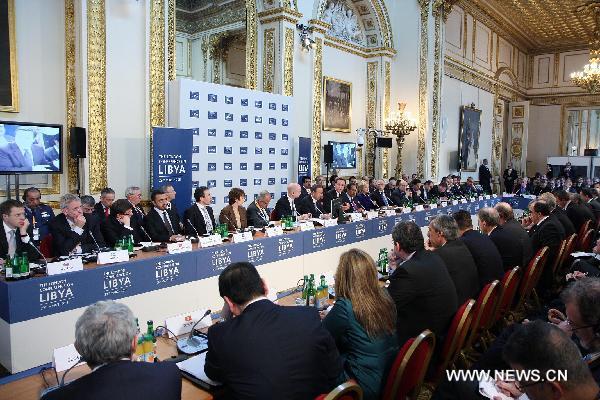London (Xinhua): The London Conference on Libya held yesterday has not settled any major problems concerning the Libyan crisis and the disputes between the countries conducting an ongoing military operation against Libya, observers say.
The three-hour conference brought together representatives from nearly 40 countries and some major international blocs including the United Nations, NATO, the European Union (EU) and the Arab League.
At a press briefing after the conference, British Foreign Secretary William Hague claimed the West-led coalition, which has conducted the military operation since March 19, has been “widened,” saying Sweden had agreed to join the operation by supplying eight fighter jets to patrol the no-fly zone.

Hague also said the conference agreed to set up a contact group to lead international efforts to map out Libya’s future.
However, the participants did not reach any consensus on the key issues such as what the final aim of the military operation is, when the operation should be wrapped up and whether NATO would limit the air strikes after assuming command, analysts say.
Meanwhile, there are a wide range of other disputes concerning the Libya crisis.
First, some major players on the global stage like the African Union (AU), Russia and China did not back the West-dominated air strikes on Libya from the beginning.
Arab League chief Amr Moussa, who has blasted the air raids, did not attend the conference at all and only sent his deputy here.
AU Commission Chairman Jean Ping, who was expected to attend the London conference, did not appear either.
Jean Ping has reiterated the AU opposes any foreign military intervention in Libya and expressed discontent toward the Western forces for not consulting with the AU sufficiently before launching the military operation.
Russia has been urging the coalition forces to cease fire in Libya immediately.
China has also opposed the military attacks by the Western forces on Libya.
Second, apparent disputes even remain among attendees of the hastily-arranged London conference.
Turkey, a NATO member, has insisted the UN Resolution 1973 on Libya adopted on March 17 has a clear framework, and any action that goes beyond the framework “is illegal.”
Meanwhile, Germany, a traditional Western power and also a NATO member, has refused to join the military operation. It abstained from voting for the UN resolution on Libya.
Third, the countries contributing to the military operation face increasing domestic pressure.
According to a latest survey conducted by the British polling consultancy ComRes, 47 percent of the questioned Britons regard the government as wrong to commit British forces to actions in Libya, and 71 percent fear the military actions could drag Britain into a prolonged conflict like the Iraq War.
Similarly, worries of “entangling the U.S. into another Iraq” still linger in the United States after President Barack Obama declared NATO would formally take over the full command of the military operation Wednesday.









